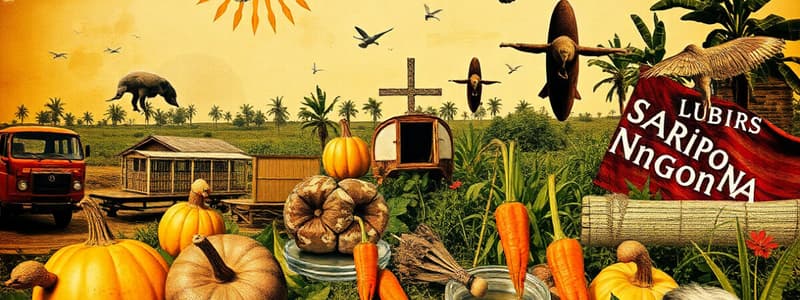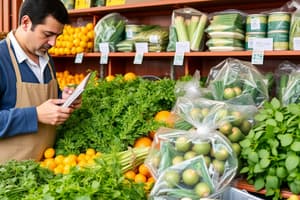Podcast
Questions and Answers
Which of the following is considered a form of agricultural smuggling under RA 11900?
Which of the following is considered a form of agricultural smuggling under RA 11900?
- Legal imports with proper documentation
- Restoration of local markets
- Under-declaration of agricultural goods (correct)
- Distribution of organic fertilizers
What is one of the penalties for individuals involved in agricultural smuggling?
What is one of the penalties for individuals involved in agricultural smuggling?
- Tax exemptions
- Imprisonment (correct)
- Community service
- Financial grants
What is the primary focus of Republic Act No. 11900?
What is the primary focus of Republic Act No. 11900?
- Providing subsidies to farmers
- Combatting agricultural smuggling (correct)
- Increasing taxes on agricultural products
- Promotion of agricultural exports
What authority does the Bureau of Customs have under RA 11900?
What authority does the Bureau of Customs have under RA 11900?
What implementation challenge involves the presence of corrupt practices within enforcement agencies?
What implementation challenge involves the presence of corrupt practices within enforcement agencies?
Which challenge impacts public understanding of agricultural smuggling's effects?
Which challenge impacts public understanding of agricultural smuggling's effects?
What challenge is associated with the complexity of legal processes in RA 11900?
What challenge is associated with the complexity of legal processes in RA 11900?
How does market pressure affect local producers in the context of agricultural smuggling?
How does market pressure affect local producers in the context of agricultural smuggling?
Flashcards are hidden until you start studying
Study Notes
RA 11900: Key Provisions
-
Definition: Republic Act No. 11900, also known as the “Anti-Agricultural Smuggling Act of 2022,” aims to combat agricultural smuggling in the Philippines.
-
Key Provisions:
- Definition of Agricultural Smuggling: Includes the unlawful importation of agricultural products, misdeclaration, and under-declaration of goods.
- Penalties: Stiff penalties for individuals and entities involved in agricultural smuggling, including imprisonment and fines.
- Authority of Bureau of Customs (BOC): Grants BOC the power to confiscate smuggled goods and take legal actions against offenders.
- Creation of a Task Force: Establishes a task force to investigate and prosecute smuggling cases.
- Promotion of Agricultural Productivity: Emphasizes the importance of protecting local farmers by ensuring fair competition.
- Public Awareness Campaigns: Mandates the government to conduct campaigns to educate the public on the impacts of agricultural smuggling.
Implementation Challenges
-
Corruption: Presence of corrupt practices within enforcement agencies may hinder effective implementation.
-
Resource Constraints:
- Limited financial and human resources for monitoring and enforcement.
- Need for better training and equipment for customs officials.
-
Legal Framework:
- Complexity of legal processes may delay prosecutions.
- Need for clearer definitions and guidelines to avoid misinterpretation of the law.
-
Coordination Among Agencies:
- Challenges in collaboration between the BOC, Department of Agriculture, and other relevant agencies.
-
Market Forces:
- Pressure from lower-priced smuggled goods may affect local market prices and discourage compliance among traders.
-
Public Awareness:
- Insufficient awareness among consumers regarding the negative effects of agricultural smuggling on local agriculture.
-
Monitoring and Reporting:
- Difficulty in tracking smuggled goods due to the vast range of agricultural products and distribution channels.
RA 11900: Key Provisions
- Republic Act No. 11900 is also known as the “Anti-Agricultural Smuggling Act of 2022.”
- The act aims to address and reduce agricultural smuggling in the Philippines.
- Agricultural smuggling includes unlawful importation, misdeclaration, and under-declaration of agricultural goods.
- The law imposes severe penalties on individuals and entities engaging in smuggling, including imprisonment and substantial fines.
- The Bureau of Customs (BOC) is empowered to confiscate smuggled goods and initiate legal actions against violators.
- A task force is established to focus on the investigation and prosecution of agricultural smuggling cases.
- The act promotes agricultural productivity by protecting local farmers and ensuring a fair competitive market.
- The government is mandated to conduct public awareness campaigns about the detrimental impacts of agricultural smuggling.
Implementation Challenges
- Corruption within enforcement agencies could significantly impede the effective application of the law.
- Resource limitations exist, affecting financial backing and personnel for adequate monitoring and enforcement efforts.
- Customs officials require improved training and access to enhanced equipment to perform their duties effectively.
- The complexity of legal procedures may lead to delays in prosecuting offenders; clearer definitions in the law are necessary to prevent misinterpretation.
- Coordination issues arise among the Bureau of Customs, Department of Agriculture, and other relevant authorities, complicating enforcement efforts.
- Market dynamics, particularly the influx of cheaper smuggled goods, can disrupt local prices and compliance rates among traders.
- There is a lack of consumer awareness regarding the adverse impacts of agricultural smuggling on local agriculture, hindering public support for the law.
- Tracking smuggled goods presents a challenge due to the extensive variety of agricultural products and their distribution channels.
Studying That Suits You
Use AI to generate personalized quizzes and flashcards to suit your learning preferences.




